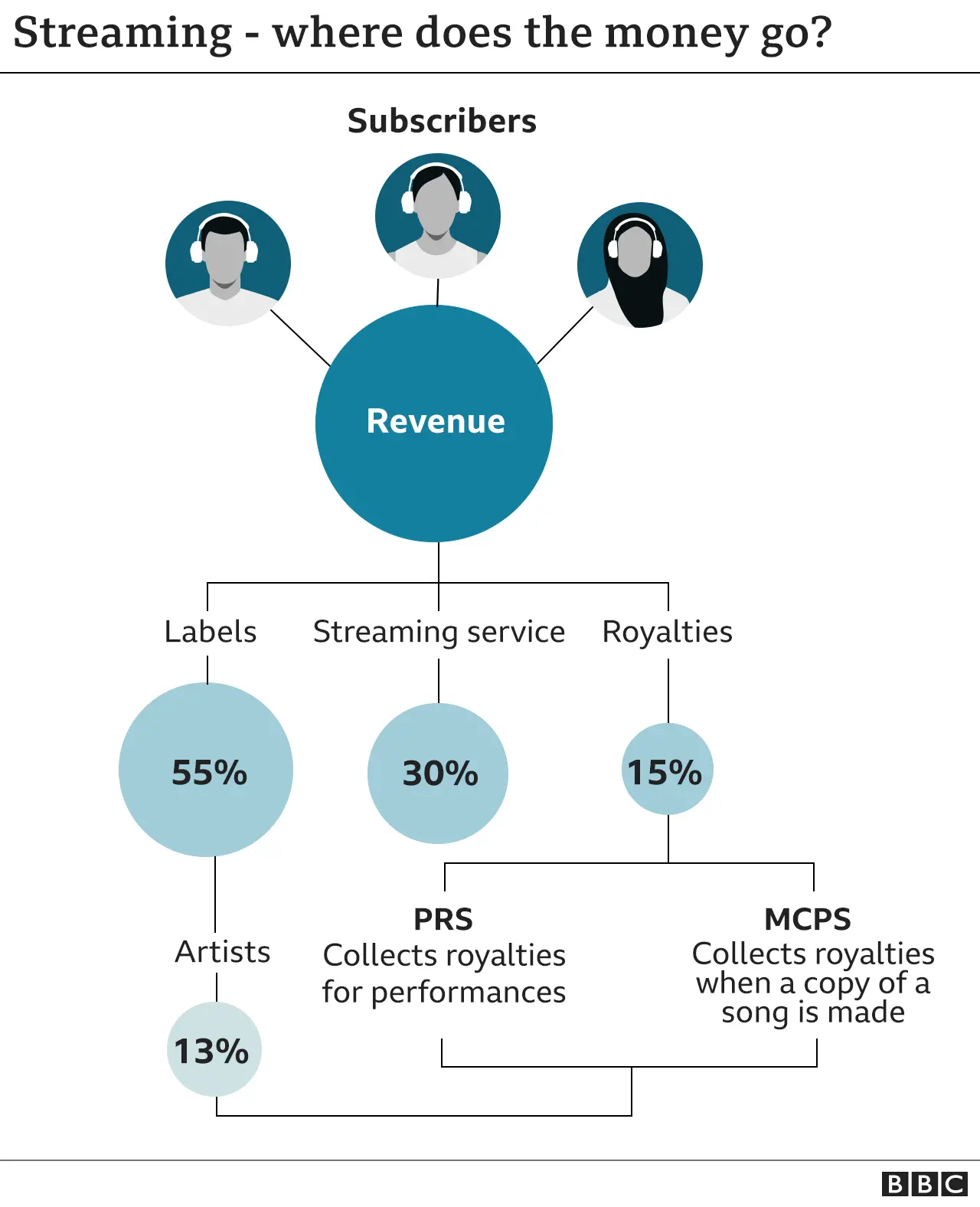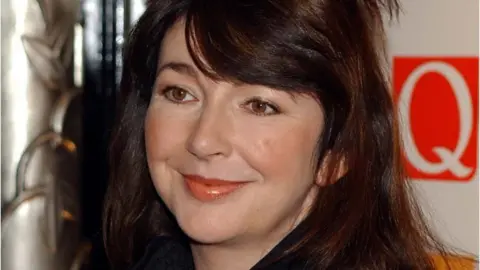MPs call for complete reset of music streaming to ensure fair pay for artists
 BBC
BBCThe music industry is weighted against artists, with even successful pop stars seeing "pitiful returns" from streaming, a committee of MPs has said.
They are calling for a "complete reset" of the market, with musicians given a "fair share" of the £736.5 million that UK record labels earn from streaming.
In a report, they said royalties should be split 50/50, instead of the current rate, where artists receive about 16%.
The findings came after a six-month inquiry into music streaming.
"While streaming has brought significant profits to the recorded music industry, the talent behind it - performers, songwriters and composers - are losing out," said Julian Knight, MP, who chairs parliament's Digital, Culture, Media and Sport (DCMS) committee.
"Only a complete reset of streaming that enshrines in law their rights to a fair share of the earnings will do."
The findings will be seen as a victory by pop stars like Mick Jagger, Paul McCartney, Melanie C, Wolf Alice and Jessie Ware, who recently called on the Prime Minister to reform the way musicians get paid when their songs are streamed.
Musician Tom Gray, whose #BrokenRecord campaign prompted the inquiry, said he was "overjoyed" by the findings.
"It feels like a massive vindication," he said. "They've really come to the same conclusions that we've been saying for a very long time."
The BPI, which represents the UK recorded music industry, was more cautious.
It said streaming was "enabling more artists than ever" to earn a "long-term, sustainable income" and that new policies should be properly examined to ensure against "unintended consequences for investment into new talent".
How do artists get paid at the moment?
At present, Spotify is believed to pay between £0.002 and £0.0038 per stream, while Apple Music pays about £0.0059. YouTube pays the least - about £0.00052 (or 0.05 pence) per stream.
All that money goes to rights-holders, a blanket term that covers everything from massive record companies to artists who release their own music. That money is then divided up between everyone involved in making the record.
Often, the recording artist will only receive about 13% of the revenue, with labels and publishers keeping the rest.


Artists who release their own music, or who work with independent labels and distribution companies, tend to get a higher share.
A survey by the Ivors Academy and Musicians' Union found that in 2019, 82% of professional musicians made less than £200 from streaming, whilst only 7% made more than £1,000.
What did musicians and labels tell the inquiry?
The hearings were full of testy exchanges. Some witnesses said they were scared to speak out for fear of reprisals; and the head of one record label was described as "living in cloud cuckoo land" after he claimed artists were happy with the music streaming model.
Mercury Prize nominee Nadine Shah made headlines after telling the committee she had been forced to move back in with her parents because "earnings from my streaming are not significant enough to keep the wolf away from the door".
Pop songwriter Fiona Bevan revealed she'd earned just £100 for a track on Kylie Minogue's number one album, Disco. "Right now, hit songwriters are driving Ubers," she told MPs. "It's quite shameful."
Chic's Nile Rodgers said that the finances of streaming are shrouded in secrecy, adding: "We don't even know what a stream is worth and there's no way you could even find out what a stream is worth, and that's not a good relationship."
The three major labels - Sony, Universal and Warner Music - faced some of the toughest questioning of the inquiry, and were accused of a "lack of clarity" by MPs.
They largely argued to maintain the status quo, saying any disruption could damage investment in new music, and resisted the idea that streaming was comparable to radio - where artists receive a 50/50 royalty split.
"Streaming is 24-7 in every country in the world, you can listen to the greatest record store ever - it's clearly a sale, it's not radio, it's on-demand," said David Joseph, CEO of Universal Music UK.
Representatives from the streaming companies suggested they were "open-minded" about changing the royalty system, but noted that 70% of their income already goes to labels, publishers and artists.
"It is a narrow-margin business, so it wouldn't actually take that much to upset the so-called apple cart," said Apple Music's Elena Segal.
What have MPs recommended?
 Getty Images
Getty ImagesThe committee's report said streaming had "undoubtedly helped save the music industry" after decades of piracy, "but it is clear that what has been saved does not work for everyone".
They recommended that the government pass legislation to give performers the right to "equitable remuneration", whereby labels and artists receive an equal share of streaming royalties.
The report called it a "simple yet effective solution", as the right already exists in UK law when songs are played on radio and TV.
MPs also raised "deep concerns" about the dominance of the major music companies, and urged the government to refer the case to the Competition and Markets Authority.
Other recommendations included:
- Musicians and songwriters should be allowed to reclaim the rights to their work from labels after a set period of time.
- Artists should be given the right to adjust their contract if their work is successful beyond the remuneration they received.
- The government should explore ways to ensure songwriters, who receive minimal streaming royalties, can have sustainable careers.
- Curators who make playlists on services like Spotify and Apple Music should adhere to a "code of conduct" to avoid bribes and favouritism.
- The government should require publishers and royalty societies to inform artists about how much money is flowing through the system.
- Warner and Universal Music should follow Sony's example, and cancel their artists' historical debts.
The committee also expressed concerns that "the economics of streaming entrench historically successful artists and create barriers for new performers", with perennial hits by Abba, Queen and Fleetwood Mac starving up-and-coming musicians of opportunities.
Figures released yesterday showed that new music accounted for just 33% of the music streamed in the US this year, with older songs dominating people's listening choices.
The streaming services themselves largely escaped criticism, but MPs said YouTube's dominance was a cause for concern - citing figures that it accounts for 51% of music streaming while contributing 7% of music industry revenue.
They warned that users' ability to upload music to YouTube without licensing it from record labels gave it an "unfair advantage"; and urged the government to introduce "legally enforceable obligations to normalise licensing arrangements" on sites that host user-generated videos, such as YouTube, TikTok and Facebook.
What's the response been?
 PA Media
PA MediaTom Gray said the report confirmed what his #BrokenRecord campaign had been telling record labels all along: "That their business model needs to change and that they need to face the reality of that and get on with it".
He said he hoped the government would enact the recommendations quickly, potentially by acting on a private member's bill by Labour MP Kevin Brennan that seeks to change copyright laws around streaming.
"This is something that they can do for the British cultural sector, where they don't have to go and negotiate with Brussels," he told the BBC. "If they want to help British creators, inventors and performers, this is something they can just do."
The Association of Independent Music (AIM) welcomed the report's praise for independent record labels, who traditionally pay higher royalty rates to their artists.
"However, our view is that equitable remuneration will not deliver the outcome they are hoping for," said CEO Paul Pacifico. "It is a 20th Century solution not fit for the 21st Century digital market and will leave the next generation of artists worse off."
The BPI argued that streaming worked in artists' favour - with 2,000 artists set to achieve 10 million streams this year, the equivalent of selling 10,000 CDs, or making about £29,000. It warned unpicking the current system could damage investment in new music.
"When considering this report, the Government also needs to consider the vital role that labels play as the leading investors into artists' careers, with investment in artists by record labels growing year-on-year," said CEO Geoff Taylor.
"We will carefully examine the findings of this report, but it is essential that any policy proposals avoid unintended consequences for investment into new talent, and do not imperil this country's extraordinary global success in music."
Meanwhile, the Musicians Union called the report "revolutionary".
"It grasps the issue, identifies the problems and recommends achievable and practical solutions, which won't cost the taxpayer a penny," said general secretary Horace Trubridge.
In a joint statement, the Featured Artists Coalition and Music Managers Forum said the "landmark" report could "fundamentally improve" the economic situation for thousands of musicians.
"This is a once in a lifetime moment to reset our business along fairer and more equitable lines, it is not an opportunity to be wasted."

Follow us on Facebook, or on Twitter @BBCNewsEnts. If you have a story suggestion email entertainment.news@bbc.co.uk.
